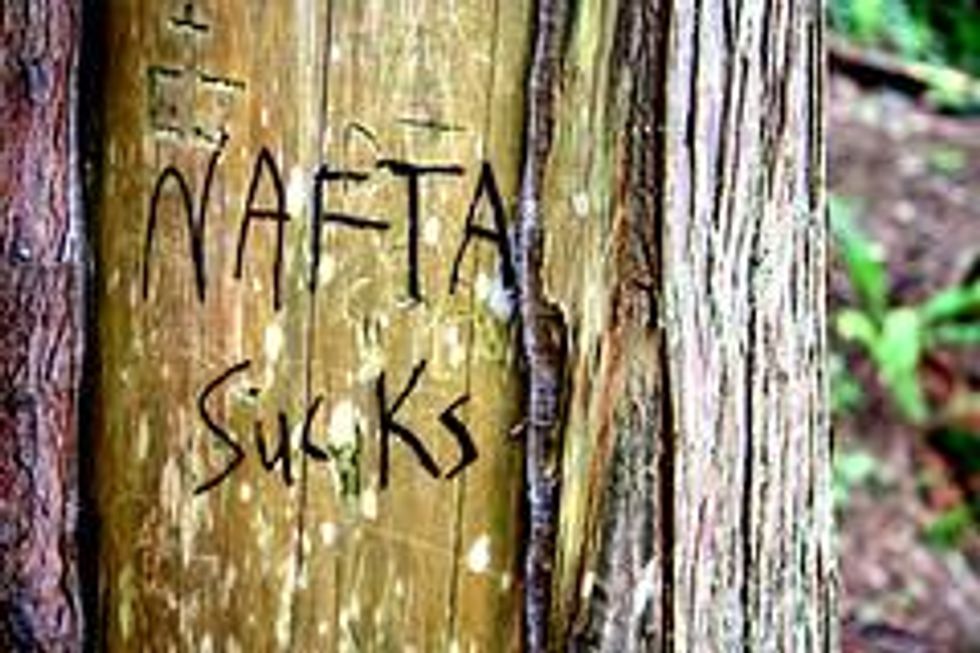Too often, the immigration debate in this country ignores the role U.S. foreign policy plays in fueling unauthorized immigration. But as the Obama administration continues to stall on immigration reform in the United States--all the while moving forward with two contentious trade agreements with Colombia and Panama--the connections between the two are worth examining.

CAFTA impoverished Salvadoran famers
During President Obama's tour of Latin America last month, ongoing mass protests underscored the U.S. government's own hand in stimulating unauthorized immigration to its borders. Reporting on the president's visit to El Salvador, for example, Juan Gonzales of Democracy Now! notes that hundreds of Salvadorans gathered to demand the renegotiation of the Central American Free Trade Agreement (CAFTA), which devastated the country's agricultural sector, impoverishing and displacing farmers. Considered alongside the country's tragic history of U.S.-backed military repression (which Democracy Now! explores in greater detail), it should be no surprise that El Salvador is the second largest source of undocumented immigrants to the United States.
NAFTA displaces one million Mexican farmers
The first, of course, is Mexico--which has its own sordid history of U.S. involvement. As Michelle Chen at Colorlines.com explains, "the deregulation of agriculture under [the North American Free Trade Agreement in the 1990s] coincided with the devastation of Mexico's farm sector, displacing some one million farmers and driving many northward across the border in search of work."
While NAFTA created considerable economic opportunities for U.S. businesses eager to conduct business in low-wage Mexico, it also allowed American farmers to flood the Mexican market with government-subsidized corn--destroying the country's own corn industry and bankrupting thousands of agricultural workers.
Obama's 180 on Latin American policy
It's worth noting that Obama, during his presidential campaign, promised to overhaul NAFTA on the grounds that "our trade agreements should not just be good for Wall Street, it [sic] should also be good for Main Street." Yet, as Steve Ellner argues in the latest issue of In These Times, Obama gradually abandoned his initially critical stance on Latin American policy--choosing instead to "placate rightist critics." Ellner adds that Obama's shifting position on the pending (CAFTA-modeled) trade agreement with Colombia--moving "from opposition...to lukewarm endorsement...to vigorous support--is just one example of his turnabout on Latin American policy."
While Obama has taken some steps to address potential labor abuses in the agreement (NAFTA and CAFTA's absence of such measures is a key criticism of the deals), trade unionists in Colombia and the United States alike have voiced skepticism:
Communications Workers of America President Larry Cohen argued against the agreement by pointing out that 15 million Colombians representing 82 percent of the working population are not recognized as workers and thus under the law "have no rights."
Big Business funds paramilitary killings in Colombia
The skepticism is well founded, as the United States has a long history of favoring business interests over the rights of workers--both at home and abroad. Earlier this month, for instance, evidence surfaced that the Cincinnati-based Chiquita Brands International may have hired Colombian paramilitary groups "responsible for countless killings" as security for its Colombian facilities. This is in spite of the fact that the U.S. Department of Justice (DOJ) concluded an investigation of Chiquita in 2007, ruling that any money paid out to the paramilitary groups--one of which was a designated terrorist watch group--was extorted, and that "Chiquita never received any actual services in exchange for them."
Jim Lobe and Aprille Muscara of Inter Press Service report that the documents were released by the National Security Archive (NSA), an independent research group, on the same day that President Obama met with Colombian President Juan Manuel Santos to discuss labor rights in the pending trade agreement. According to Michael Evans, NSA's chief researcher on Colombia, the evidence against Chiquita is clear.
"What we still don't know is why U.S. prosecutors overlooked what appears to be clear evidence that Chiquita benefited from these transactions," he told IPS.
U.S. banks launder billions for Mexican drug cartels
Even more recently, news broke that the federal government failed to prosecute a number of U.S. banks guilty of laundering billions of dollars for Mexican drug cartels. New America Media/Al Dia reports that Wachovia (now owned by Wells Fargo) alone moved $378.4 billion for cartels through money exchangers and $4.7 billion handled in bulk cash between 2004 and 2007. Yet this past March, the federal government formally dropped all charges against the bank, per a settle agreement reached the previous year, and despite Wachovia's indirect role in financing a five-year drug war that has taken countless lives and continues to drive unauthorized immigration to the United States.
